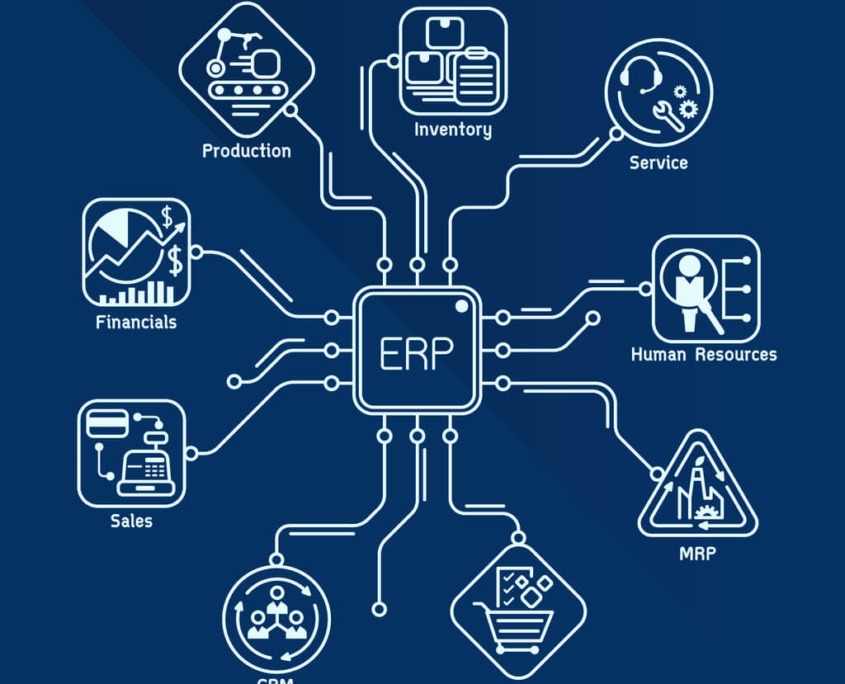It’s no secret that efficiency is the key to staying competitive. As businesses seek to streamline operations and improve their customers’ experience, the integration of ERP (enterprise resource planning) and e-commerce has been a game-changer.
In this article, we’ll explore how this integration can transform your business operations and make your life as a business owner much smoother.
Understanding the Need for Integration
When businesses use separate systems that “don’t talk” to each other, it’s like having different puzzle pieces from various sets that don’t fit together. These disconnected systems are called “siloed systems”.
When your ERP and e-commerce platforms operate independently, essential information becomes trapped in “data islands”, thus, employees spend valuable time manually transferring and keying-in information between systems. These manual processes not only introduce the possibility of data errors but also contribute to delays in data availability, impeding real-time insights.
That’s why integrating your business system with your e-commerce platform is like putting all those puzzle pieces into one big, clear picture. It helps to run smoothly and makes your business much more effective.

ERP and E-commerce Connection
The connection between ERP and e-commerce is vital for modern business success. ERP systems handle different tasks like managing stock and money matters.
Here are a few examples of popular branded ERP (Enterprise Resource Planning) systems that are widely used by businesses:
SAP ERP: SAP is one of the most well-known and widely used ERP systems globally. It offers a comprehensive suite of modules to manage various aspects of business operations, including finance, supply chain, human resources, and more.
Oracle ERP Cloud: Oracle’s ERP Cloud provides a scalable and flexible solution for businesses of all sizes. It offers modules for financial management, procurement, project management, and more, all accessible through the cloud.
Microsoft Dynamics 365: Microsoft’s ERP solution, part of the Dynamics 365 suite, offers modules for financial management, supply chain, sales, and customer service. It’s known for its integration with other Microsoft products and its user-friendly interface.
NetSuite: Oracle’s NetSuite is a cloud-based ERP system that caters to various industries. It covers financial management, e-commerce, CRM, and more in a single integrated platform.
Infor CloudSuite: Infor provides a range of industry-specific ERP solutions, such as CloudSuite Manufacturing, CloudSuite Healthcare, and others. These systems are designed to meet the unique needs of different sectors.
Epicor ERP: Epicor offers ERP solutions tailored to manufacturing, distribution, retail, and service industries. Its system helps streamline operations, from supply chain to customer management.
IFS Applications: IFS specializes in solutions for industries like aerospace, defense, manufacturing, and more. Its ERP system covers everything from project management to service management.
Acumatica: Acumatica is a cloud-based ERP system known for its flexibility and customizable modules. It offers solutions for financial management, distribution, CRM, and more.
These are just a few examples, and the choice of ERP system depends on the specific needs and industry of the business. Each of these systems offers various features and benefits to help businesses manage and optimize their operations.
On the other hand, e-commerce platforms are the virtual storefronts that enable businesses to sell their products and services online. These platforms not only facilitate online transactions but also foster meaningful interactions with customers through features like reviews, personalized recommendations, and customer support. E-commerce has transformed the way businesses reach their target audience and generate revenue.
Benefits of ERP and E-commerce Integration
Integrating ERP system and e-commerce comes with several benefits for businesses.
- Increased Operational Efficiency: Integrating your systems reduces manual work and errors. No more entering the same data multiple times!
- Real-time Data Insights: Imagine making decisions based on up-to-the-minute data. Integrated systems give you accurate insights for smarter choices.
- Enhanced Customer Experience: Integrated systems mean your customers get a smoother buying experience, from placing orders to getting updates.
- Improved Inventory Management: No more guessing games with inventory. Integrated systems give you real-time inventory updates.

ERP and E-commerce: Custom vs. Generic Integration
Achieving successful integration between ERP system and e-commerce requires strategic planning and careful execution. To start, it’s crucial to choose the right technology that aligns with your business needs.
When considering integration strategies, a dilemma often arises: “custom approach or use of ready-made applications”.
Here’s the secret sauce: custom integration. While generic connectors can work, they might not fit your business like a tailored suit. With custom integration, we create a solution that matches your business needs perfectly.
Customization allows tailored alignment with your business processes, enabling a precise fit that pre-built solutions might not achieve.
USEFUL: Shopify Integration with ERP/CRM system
Custom integrations offer flexibility to accommodate unique requirements, evolving alongside your business. Furthermore, custom integration empowers you to optimize workflows and data flow according to your specific needs, ultimately boosting efficiency and effectiveness.
In essence, while both approaches have their merits, custom integration stands out for its accuracy, security, stability and smooth operation that is tailored to your business needs.
ERP integration: Steps to Get Started
Embarking on the journey of integrating your existing ERP system and e-commerce can be straightforward with the right approach. Here’s a step-by-step guide for businesses looking to streamline their operations through integration:
Assess Your Integration Needs
Begin by understanding your business requirements and objectives. Identify pain points, bottlenecks, and areas where integration could make a significant impact.
Choose a Reliable Integration Partner
If you’re not an integration specialist, don’t worry. Companies like Namtek Consulting Services specialize in seamless business systems and e-commerce integrations. You don’t need to have internal integration expertise; simply turn to experienced providers like Namtek to handle the entire process for you.
Plan the Integration
Collaborate closely with your chosen integration partner to design a tailored integration plan. This plan should address data mapping, synchronization, and customization to align with your specific business processes.
Data Mapping and Field Matching
Work together with your integration provider to map data fields between your ERP and e-commerce. This ensures that information moves accurately and consistently between platforms.
Testing and Quality Assurance
Carefully test the integration before going live. This helps identify and address any issues, ensuring a smooth transition.
Deployment and Training
Once testing is successful, implement the integration. Train your teams to ensure they understand how to use the integrated systems effectively.
Ongoing Support
A reliable integration partner like Namtek provides ongoing support to address any post-implementation issues and ensure smooth operation.
By partnering with an experienced integration provider, you can simplify the entire integration process. You don’t need to be an integration specialist yourself; Namtek offers turnkey integration solutions that cater to your unique business needs. With Namtek’s expertise, businesses can seamlessly align their ERP system and e-commerce platform, unlocking enhanced efficiency, improved accuracy, and a streamlined operation overall.
Successful Integration with Namtek Consulting Services
There are many ERP systems like SAP, Oracle, and Microsoft Dynamics, and popular e-commerce platforms like Shopify, Magento, WooCommerce, and Amazon. But don’t worry, we’re here to guide you through the right integration approach. Don’t wait—unlock the power of integrated ERP system and e-commerce platform. Contact us today for your free consultation.


